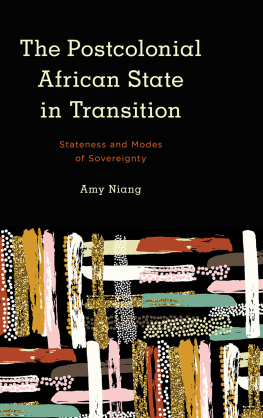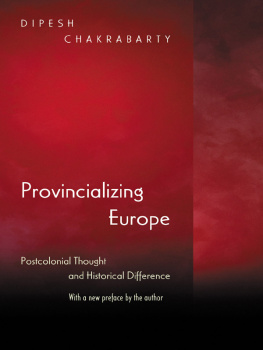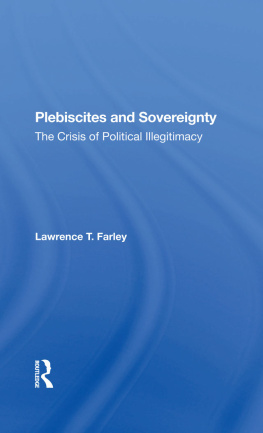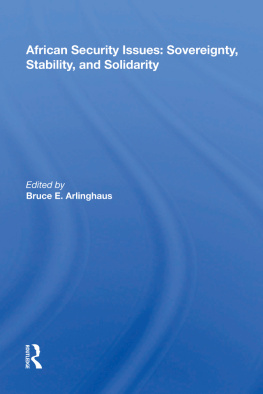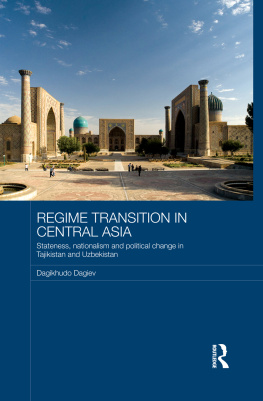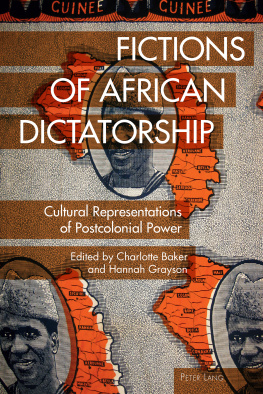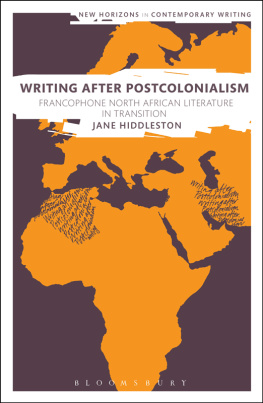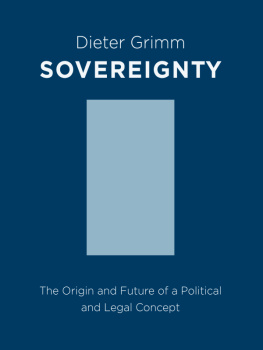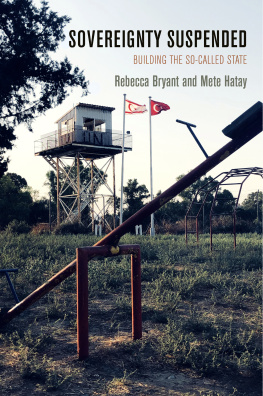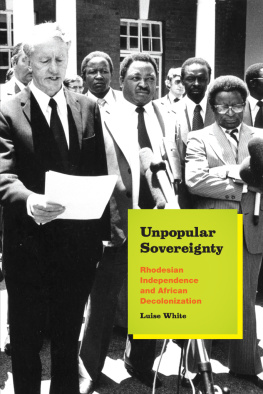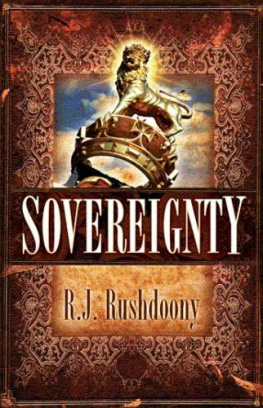i The Postcolonial African
State in Transition
ii Kilombo: International Relations
and Colonial Questions
This is the first series to mark out a dedicated space for advanced critical inquiry into colonial questions across International Relations. The ethos of this book series is reflected by the bricolage constituency of Kilombos settlements of African slaves, rebels and indigenous peoples in South America who became self-determining political communities that retrieved and renovated the social practices of its diverse constituencies while being confronted by colonial forces. The series embraces a multitude of methods and approaches, theoretical and empirical scholarship, alongside historical and contemporary concerns. Publishing innovative and top-quality peer-reviewed scholarship, Kilombo enquires into the shifting principles of colonial rule that inform global governance and investigates the contestation of these principles by diverse peoples across the globe. It critically re-interprets popular concepts, narratives and approaches in the field of IR by reference to the colonial question and, in doing so, the book series opens up new vistas from which to address the key political questions of our time
Series Editors: Mustapha K. Pasha, Aberystwyth University
Meera Sabaratnam, SOAS University of London
Robbie Shilliam, Queen Mary University of London
Titles in the Series
Meanings of Bandung: Postcolonial Orders and Decolonial Visions , edited by Qunh N. Phm and Robbie Shilliam
Politics of the African Anticolonial Archiv e, edited by Shiera S. el-Malik and Isaac A. Kamola
Asylum after Empire: Colonial Legacies in the Politics of Asylum Seeking , Lucy Mayblin
Decolonizing Intervention: International Statebuilding in Mozambique , Meera Sabaratnam
Global Development and Colonial Power: German Development Policy at Home and Abroad , Daniel Bendix
The Postcolonial African State in Transition: Stateness and Modes of Sovereignty , Amy Niang
iii The Postcolonial African
State in Transition
Stateness and Modes
of Sovereignty
Amy Niang
iv Published by Rowman & Littlefield International Ltd
6 Tinworth Street, London SE11 5AL, United Kingdom
www.rowmaninternational.com
Rowman & Littlefield International Ltd.is an affiliate of Rowman & Littlefield
4501 Forbes Boulevard, Suite 200, Lanham, Maryland 20706, USA
With additional offices in Boulder, New York, Toronto (Canada), and Plymouth (UK)
www.rowman.com
Copyright 2018 by Amy Niang
All rights reserved . No part of this book may be reproduced in any form or by any electronic or mechanical means, including information storage and retrieval systems, without written permission from the publisher, except by a reviewer who may quote passages in a review.
British Library Cataloguing in Publication Data
A catalogue record for this book is available from the British Library
ISBN: HB 978-1-7866-0652-5
PB 978-1-7866-0653-2
Library of Congress Cataloging-in-Publication Data Is Available
ISBN 978-1-78660-652-5 (cloth: alk. paper)
ISBN 978-1-78660-653-2 (pbk: alk. paper)
ISBN 978-1-78660-654-9 (electronic)

The paper used in this publication meets the minimum requirements of American National Standard for Information SciencesPermanence of Paper for Printed Library Materials, ANSI/NISO Z39.48-1992.
Printed in the United States of America
v To Harald Kleinschmidt
xi Acknowledgements
I would like to express my sincere thanks to Robbie Shilliam and Meera Sabaratnam, who have been incredibly supportive editors on top of being inspiring scholars and colleagues. Their comments and those of the different reviewers have helped improve the manuscript. Im most grateful for the assistance provided by Dhara Snowden, Rebecca Anastasi, Lisa Whittington and the Rowman & Littlefield team.
Meera Venkatachalam generously read and critiqued a full draft of the manuscript. She has been and remains a wonderful interlocutor on all things West African. The late Michel Izard was very kind to share some of his archival materials with me and to engage in extensive discussions about Voltaic societies. This book builds upon my PhD project and it greatly benefited from the supervision and guidance of Paul Nugent, Sara Dorman and Andrew Lawrence. Im grateful to Siba Grovogui for his generous insights on the project. Jean Comaroff also provided feedback on the general orientation of the book.
A valuable encounter, many years ago, with the work of Joseph Ki-Zerbo inspired my curiosity for precolonial African history and forms of political rationality that informed governance traditions among the Bamana, the Mossi, the Bobo, the Wolof and many other societies.
My overall intellectual debt goes to Harald Kleinschmidt. Beyond a sustained and patient attention for my very early attempts at understanding the precolonial African state, he always provided detailed and considerate comments on my work, and he encouraged me to be persistent in seeing this project through.
I would like to thank my colleagues in the Department of International Relations at the University of the Witwatersrand. The steady support of friends Robtel Neajai Pailey, Holly Davis, Wendy Willems, Christian xii Schonaers, Janis Rosheuvel, Toni Haastrup, Yacine Gaye, Safiatou Ndiaye Diop, Colette Gordon, Mopeli Moshoeshoe and also family, especially my parents, my sister Rokhaya, and the Ndiaye team, Mustafa, Momar and Abbi, has been particularly motivating.
Professor Ousmane Sene of the West African Research Center and his dedicated staff provided a welcoming home during my African Humanity Program (AHP) residency in Dakar during which parts of the manuscript were completed. The project benefited from generous funding from the American Council for the Learned Society through the AHP. Funding for previous fieldwork came from the West African Research Association. Many thanks also to Salah Hassan who facilitated a research fellowship at Cornell University, which enabled access to the resources of the Africana library.
Chapter 1
Political History as State Ideology
Introduction
The present book contends that the state in African contextswhether precolonial, colonial or postcolonialwas always a transient phenomenon that pushed against internal others. From this perspective, postcolonial state failure is the result of the disarticulation of the mechanisms that gave constitutional and normative meaning to cultural values and practices and to political legitimation processes of both state and non-state fields of action. The book thus returns to a neglected question that, to this project, is crucial to understanding the difficulties of the postcolonial African state, namely: What was the state internally built against , or What social forms did the advent of the centralized state displace? Answers to this question can shed light on various dimensions of the current African state, including but not limited to the absence of sovereignty, the lack of legitimacy, the withdrawal of the citizenry from constitutional life, the collapse of state institutions and the difficult integration of traditional and diverse modes of meaning-making in the modern state. In addressing the above question, this book also offers a perspective on a set of fundamental, related sub-questions about the state with salient contemporary resonance; for instance What is the nature of the state? How did it come about? Why does it continue to endure as the most persistent form of sociopolitical organization (Spruyt 1994)? These questions seem pertinent today in the context of the precariousness and failures of the postcolonial African state. In fact, if much has been said about the conditions of the African state, many more questions remain to be examined.

 The paper used in this publication meets the minimum requirements of American National Standard for Information SciencesPermanence of Paper for Printed Library Materials, ANSI/NISO Z39.48-1992.
The paper used in this publication meets the minimum requirements of American National Standard for Information SciencesPermanence of Paper for Printed Library Materials, ANSI/NISO Z39.48-1992.
